By John Crump
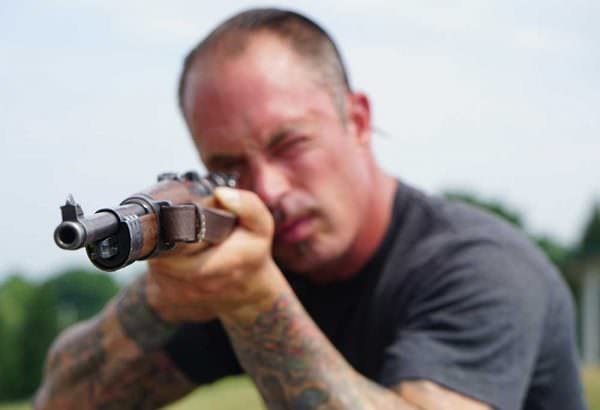
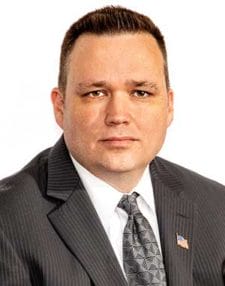
U.S.A. –-(Ammoland.com)- Paul Shull has done many things over his 43 years of life. Straight out of high school he backpacked around Thailand before setting out for on a career in rock and roll where he promoted touring acts such as Motörhead, Garbage, and Pennywise. He also was the stage manager for bands such as Gold Finger and Bloodhound Gang. In 2004 he was named president of DC Flag Records who had such acts as iTunes top 10 artist MC Chris.
Paul is also an avid fencer. He is the former chair of The Canadian Fencing Historical Committee and president of Excelsior Fencing Escrime. He is also a certified fencing instructor who has competed and coached for many fencers.
More recently Paul has become the host of the TV show The Weapon Hunter that airs every Sunday at 9PM on The Smithsonian Channel. His love of Militaria comes from his great grandfather who was a veteran of both World Wars. Through the memory of his grandfather, Paul has set out to tell the story of veterans from all wars.
I had a chance to talk to Paul about military, history, weapons, and his quest to tell story of veterans.
John: What is your background?
Paul: I come from the music world. I did international stage management for years, but I right out of high school I got into autobody and collision work. I became an ace painter, and then I fell into rock and roll. I wanted to get out of the late night business, and I have always been struck by history. Me and a friend of mine decided there wasn’t enough military history on TV so we went and developed our own TV show. I also moonlight by doing historic restoration on homes. I moon light doing that, but mostly I run around the world and blow stuff up. That is kind of my thing.
John: What sparked your interest in Militaria?
Paul: It was actually my great grandfather’s fault. I was about eight or seven years old and I used to hate visiting with him because I was so young. He had emphysema, and every time he coughed it sounded like he was going to die. It really scared me!
We would go over to his house every Sunday and I would be so bored. Then one time he said “would you like to look at my military books”, and I was like “sure”. I started looking at them. I guess I was like seven or eight at the time. I was in a completely different world.
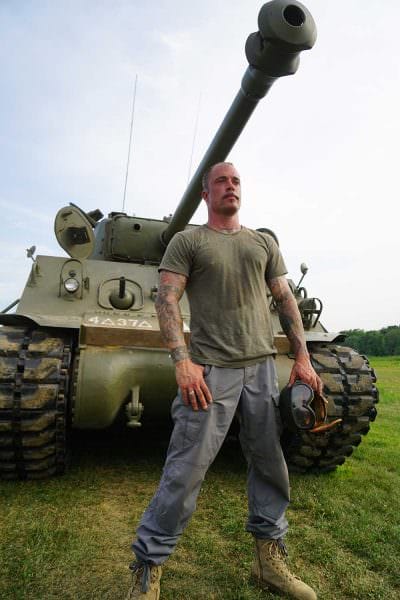
It was almost like an addiction for me. I could not get enough of militaria. I would go over and I would look at the pictures. Then I started reading the books. Finally he said, “would you like to have these one day?” I said “absolutely”. He said “I will get them ready for you. I will prepare them.” I had no idea what he meant at the time.
This was the only time he ever sat down with me one on one. I went over there and he sat down with me and we went through the books. We were going through the pages and one part of a book said “do not read.” I said, “Grandpa, why shouldn’t I read this?”, and he pointed to the section in the book and said, “I was there and that didn’t happen.”
I was like “oh my god!” It was a profound moment. This man was sitting right in front of me and I could trace him to these books. I don’t know what it did to me, but it hit me so hard and so profoundly that it altered the course of my life. It has been growing inside me ever since. My love and fascination with militia has only gotten stronger. Now I am a 43 year old man I feel the same as I felt when I was eight.
John: How did you get involved in fencing?
Paul: I was just curious really. I just wanted to pick it up. I was traveling in the United States when I called a local fencing club back in Canada. I just got bit by the fencing bug and just never left the club.
I fenced. I did some competition. I immediately got into coaching. I got my CI (certified instructor) certification, and then I coached for a couple of years. I became president of the club. It really was on my forefront. I spent two or three nights a week there for five years.
Again it all goes back to the history. The history of the sword. I had to give it a try. It is one of the greatest sports out there.
John: How was it going from the rock and roll music scene to the weapons scene?
Paul: It’s not all that different to be honest. You get passionate people, and I love passionate people. Our collectors are some of the most passionate people on the planet. A lot of the these collectors really understand time more than anyone else out there. They know their time with these artifacts are so limited, and they know they are the custodians of these objects for only but a moment. For the course of their lives. Then it is done.
A lot of guys spend all this time amassing these huge collections, and then spend a lot more of their time looking to find where it is going to go when they are gone. That is the real challenge. How do you keep the history alive? You think it would pass from generation to generation in a family, but sometimes that is not the case. A lot of these guy’s challenge is to find out where it is going to go when they are gone.
The transition for me was very easy and very smooth because I have been around militaria my whole life. Members of my family have served in both the Canadian military and the United State military It is ingrained in my family, and in turn it is ingrained in me. The switch was not that difficult to be honest.
John: What is your favorite weapon of all time?
Paul: This is a tough one, and I am going to take so much flack for it. I have to mention two. I can’t boil it down to one. For light machine gun it got to be the FG-42.
For all around all and all purpose favorite rifle of all time it has to be the M1 Garand. Hands down. I can’t get enough. The two things that feel right in my hand are a .45 Colt 1911, My hand was built for that weapon, and a M1 Garand.
If I was marooned on a desert island with one weapon it would be the M1 Garand.
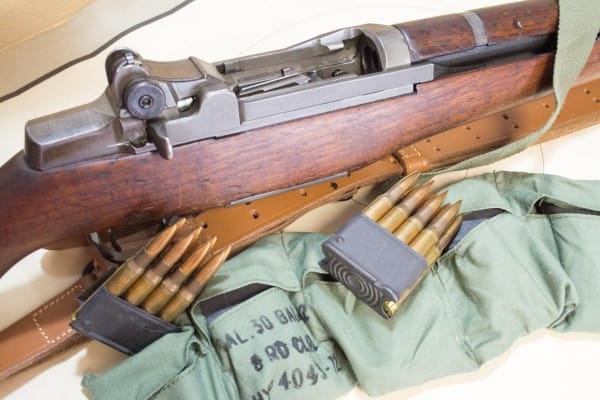
John: What is The Weapon Hunter about?
Paul: The premise of the show is we find it, we fix it, and we fire it. That is the basic point of the program, but it is the veterans that make the show so compelling. Their stories are the reasons we do it.
We are losing veterans at an alarming rate. They are not getting any younger. For us to have a platform to hear their stories in their own words because they were there it brings me back to my great grandfather. As a man I would give anything just to talk to him again. I would talk to him over any other person in history. Just man to man. I would love just to have 10 more minutes with that guy.
The show is about militaria, military history, and our veterans. That is what the show boils down to. We find these weapons, we fix them, and we fire them at the end. It always ties into a veteran or a veteran’s story. At the end of the day I am not an actor. What I am is a conduit. I am a storyteller. I am a conduit to the general public.
Put it this way. I sat with Jim “Pee Wee” Martin. I am sitting there and we are firing the M1 Garand. I ask him when was the last time he fired one, and he looks at me and says “Battle Of The Bulge.” Forget about me. I want to listen to him. I could listen to him for days. That is what the show is about. The vets in their own words. Because soon they are all going to be gone.
John: What has been your favorite experience on the show?
Paul: My favorite experience would have been the B-25. I got to fly with a vet in his 90s and he hadn’t been up in one since he was a kid in the Marines, and sitting beside him at take off I look over and this man is just crying with tears of joy. In the absolute twilight of his life getting to fly once again in his ”baby”.
That was the most profound moment of my life. Other than the birth of my son it struck me like no other moment. I would have to say that moment right there was the most profound moment of the show.
John: Did you ever imagine you would be doing something as cool as The Weapon Hunter?
Paul: If you met me 10 years ago and gave me a glimpse behind the kimono and been like, “check this out” I would have laughed you off as a fool. I would have never in a million years thought I would be this lucky and this blessed with what I do.
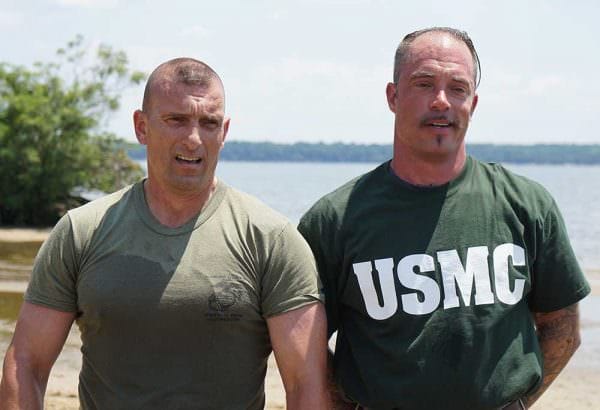
John: The show was developed for a Canadian network. Did you think it would go international?
Paul: We did actually. That was always the main play to get it to the US. We did not think it would go as big as it did. We sold it to like 86 country. It blew up.
We have over 100,000 Facebook followers. I don’t like calling people fans. I would rather say “friends of the show”. We have a lot of friends of the show. People who like it, like it a lot, I am absolutly greatful that people like our work.
You know what? We make good TV. If we made a piece of crap I would have to wear it, but I am proud of the job we were able to do, and I proud of the fact we get to tell the history because the history needs to be told.
The minute we forgot history we are fools. The thing is I got a great life. My life is amazing and it is due to the fact we stand on the shoulders of giants. We have a great civilization today because the sacrifices of those that came before us.
I take that very seriously, and that is the reason we pay homage to our veterans of all wars on the show. Both near or far. Past or present. The need to pay respect because these people allow me, a civilian, to do what I do, and have a great life doing it.
John: Was there any ideas that were pitched that were just impossible to pull off?
Paul: The one thing that eludes me is a flame tank. I want a flame tank. I want to build a flame tank, and we haven’t been able to do it yet. So God willing we get a season three; look out because I want to build one.
I want to see a what a flamethrower that shoots 300 yards looks like. That is what I want to see!
John: People in the US assume there isn’t a gun culture in Canada. How big is the gun culture in the Great White North?
Paul: There is a good strong gun culture here. We are alive and well. Due to regulations and rules it is not as free as the US is as far as carrying . You can not carry here. There is so many permits you have to get here, but I got guns. I love guns. My friends have guns. There is a culture here.
Down in The States though I got to admit we are a bit envious. So you guys got a good thing going. Don’t lose it. That is all I am saying. Don’t lose it.
John: Do you have anything in your personal collection that is special to you?
Paul: I collect swords. That is kind of my thing. One of my favorite pieces is a turn of the century Masonic Temple ceremonial sword. It is a spree used in ceremonies. The sword was made in New York. It is about a little more than 100 years old. The detail on the scabbard is actually some of the best I have ever seen so that holds a nice place in my heart, and in my collection.
I was actually just looking at it the other day thinking it is time to take it down and clean it again. Who am I kidding? I want to take it down and play with it a little bit.
The other thing I have is my great grandfather’s World War 2 dress blouse, and I have his medals. That is very cool. My great grandfather served both in World War 1 and World War 2. He lied about his age to get into World War 1, and then he lied about his age to get into World War 2. He was too young for one and too old for the other.
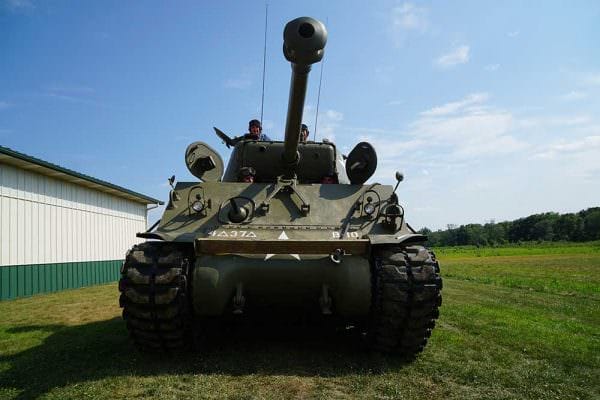
John: If you could have any weapon ever made what would it be and why?
Paul: There is two things. I got say two. One would be a sword from The Crusades. That is number one, and for number two give me the old Ma Deuce. Give me a .50 cal, and I will as happy as a clam.
The Ma Deuce can not be beat. You cannot step to that weapon. From an engineering standpoint to a survivability standpoint that thing has served the US military forever, and it ain’t going anywhere because it is perfect!
John: Would you like the readers to know anything else?
Paul: We need your support. Tune in and watch our show. We are on The Smithsonian Channel in America every Sunday night at 9PM. If they turn this week it is the “franken-gun” episode which is the last of our six. I am hearing rumors on March 25th there will be a marathon so tune in for that.
I also just want the readers to know that the gun culture is alive and well. Also the history culture is alive and well. History is important. Pick up a book and read it, and if you have children get them involved in military history. Keep this stuff alive.
Pay your respects to your veterans. Hear their stories. If Grand Pa or Grandma served pick as much knowledge as you can. Pick their brains as much as possible because when they are gone, they are gone. All those questions you wanted to ask you should because if you don’t it will be too late one day. Like I said the one person in my life I wish I had some more time with would be my great father just to hear some of stuff instead of sitting here as a 43 year old man wondering what he went through.
So tune in and check it out and see what you think.
The season finale of the second season The Weapon Hunter premieres at 9pm on The Smithsonian Channel.
About John Crump
John is a NRA instructor and a constitutional activist. He is the former CEO of Veritas Firearms, LLC and is the co-host of The Patriot News Podcast which can be found at www.blogtalkradio.com/patriotnews. John has written extensively on the patriot movement including 3%’ers, Oath Keepers, and Militias. In addition to the Patriot movement, John has written about firearms, interviewed people of all walks of life, and on the Constitution. John lives in Northern Virginia with his wife and sons and is currently working on a book on the history of the patriot movement and can be followed on Twitter at @crumpyss or at www.crumpy.com.
